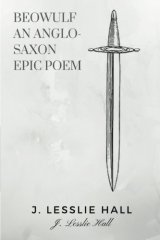Beowulf Page #14
Beowulf is an Old English epic poem consisting of 3,182 alliterative lines. It is one of the most important works of Old English literature. The date of composition is a matter of contention among scholars; the only certain dating pertains to the manuscript, which was produced between 975 and 1025.
{If his mother yet liveth, well may she thank God for this son.} Failed to perform. May affirm very truly What woman soever in all of the nations Gave birth to the child, if yet she surviveth, 20 That the long-ruling Lord was lavish to herward In the birth of the bairn. Now, Beowulf dear, {Hereafter, Beowulf, thou shalt be my son.} Most excellent hero, I'll love thee in spirit As bairn of my body; bear well henceforward The relationship new. No lack shall befall thee 25 Of earth-joys any I ever can give thee. Full often for lesser service I've given [34] Hero less hardy hoard-treasure precious, {Thou hast won immortal distinction.} To a weaker in war-strife. By works of distinction Thou hast gained for thyself now that thy glory shall flourish 30 Forever and ever. The All-Ruler quite thee With good from His hand as He hitherto did thee!" {Beowulf replies: I was most happy to render thee this service.} Beowulf answered, Ecgtheow's offspring: "That labor of glory most gladly achieved we, The combat accomplished, unquailing we ventured 35 The enemy's grapple; I would grant it much rather Thou wert able to look at the creature in person, Faint unto falling, the foe in his trappings! On murder-bed quickly I minded to bind him, With firm-holding fetters, that forced by my grapple 40 Low he should lie in life-and-death struggle 'Less his body escape; I was wholly unable, {I could not keep the monster from escaping, as God did not will that I should.} Since God did not will it, to keep him from going, Not held him that firmly, hated opposer; Too swift was the foeman. Yet safety regarding 45 He suffered his hand behind him to linger, His arm and shoulder, to act as watcher; {He left his hand and arm behind.} No shadow of solace the woe-begone creature Found him there nathless: the hated destroyer Liveth no longer, lashed for his evils, 50 But sorrow hath seized him, in snare-meshes hath him Close in its clutches, keepeth him writhing In baleful bonds: there banished for evil The man shall wait for the mighty tribunal, {God will give him his deserts.} How the God of glory shall give him his earnings." 55 Then the soldier kept silent, son of old Ecglaf, {Unferth has nothing more to say, for Beowulf's actions speak louder than words.} From boasting and bragging of battle-achievements, Since the princes beheld there the hand that depended 'Neath the lofty hall-timbers by the might of the nobleman, Each one before him, the enemy's fingers; 60 Each finger-nail strong steel most resembled, The heathen one's hand-spur, the hero-in-battle's Claw most uncanny; quoth they agreeing, [35] {No sword will harm the monster.} That not any excellent edges of brave ones Was willing to touch him, the terrible creature's 65 Battle-hand bloody to bear away from him. [1] B. and t.B. read 'staþole,' and translate stood on the floor. [2] For 'snaring from Grendel,' 'sorrows at Grendel's hands' has been suggested. This gives a parallel to 'láðes.' 'Grynna' may well be gen. pl. of 'gyrn,' by a scribal slip. [3] The H.-So punctuation has been followed; but B. has been followed in understanding 'gehwylcne' as object of 'wíd-scofen (hæfde).' Gr. construes 'wéa' as nom abs. XVI. HROTHGAR LAVISHES GIFTS UPON HIS DELIVERER. {Heorot is adorned with hands.} Then straight was ordered that Heorot inside[1] With hands be embellished: a host of them gathered, Of men and women, who the wassailing-building The guest-hall begeared. Gold-flashing sparkled 5 Webs on the walls then, of wonders a many To each of the heroes that look on such objects. {The hall is defaced, however.} The beautiful building was broken to pieces Which all within with irons was fastened, Its hinges torn off: only the roof was 10 Whole and uninjured when the horrible creature Outlawed for evil off had betaken him, Hopeless of living. 'Tis hard to avoid it {[A vague passage of five verses.]} (Whoever will do it!); but he doubtless must come to[2] The place awaiting, as Wyrd hath appointed, 15 Soul-bearers, earth-dwellers, earls under heaven, Where bound on its bed his body shall slumber {Hrothgar goes to the banquet.} When feasting is finished. Full was the time then That the son of Healfdene went to the building; [36] The excellent atheling would eat of the banquet. 20 Ne'er heard I that people with hero-band larger Bare them better tow'rds their bracelet-bestower. The laden-with-glory stooped to the bench then (Their kinsmen-companions in plenty were joyful, Many a cupful quaffing complaisantly), 25 Doughty of spirit in the high-tow'ring palace, {Hrothgar's nephew, Hrothulf, is present.} Hrothgar and Hrothulf. Heorot then inside Was filled with friendly ones; falsehood and treachery The Folk-Scyldings now nowise did practise. {Hrothgar lavishes gifts upon Beowulf.} Then the offspring of Healfdene offered to Beowulf 30 A golden standard, as reward for the victory, A banner embossed, burnie and helmet; Many men saw then a song-famous weapon Borne 'fore the hero. Beowulf drank of The cup in the building; that treasure-bestowing 35 He needed not blush for in battle-men's presence. {Four handsomer gifts were never presented.} Ne'er heard I that many men on the ale-bench In friendlier fashion to their fellows presented Four bright jewels with gold-work embellished. 'Round the roof of the helmet a head-guarder outside 40 Braided with wires, with bosses was furnished, That swords-for-the-battle fight-hardened might fail Boldly to harm him, when the hero proceeded {Hrothgar commands that eight finely caparisoned steeds be brought to Beowulf.} Forth against foemen. The defender of earls then Commanded that eight steeds with bridles 45 Gold-plated, gleaming, be guided to hallward, Inside the building; on one of them stood then An art-broidered saddle embellished with jewels; 'Twas the sovereign's seat, when the son of King Healfdene Was pleased to take part in the play of the edges; 50 The famous one's valor ne'er failed at the front when Slain ones were bowing. And to Beowulf granted The prince of the Ingwins, power over both, O'er war-steeds and weapons; bade him well to enjoy them. In so manly a manner the mighty-famed chieftain, [37] 55 Hoard-ward of heroes, with horses and jewels War-storms requited, that none e'er condemneth Who willeth to tell truth with full justice. [1] Kl. suggests 'hroden' for 'háten,' and renders: Then quickly was Heorot adorned within, with hands bedecked.--B. suggests 'gefrætwon' instead of 'gefrætwod,' and renders: Then was it commanded to adorn Heorot within quickly with hands.--The former has the advantage of affording a parallel to 'gefrætwod': both have the disadvantage of altering the text. [2] The passage 1005-1009 seems to be hopeless. One difficult point is to find a subject for 'gesacan.' Some say 'he'; others supply 'each,' i.e., every soul-bearer ... must gain the inevitable place. The genitives in this case are partitive.--If 'he' be subj., the genitives are dependent on 'gearwe' (= prepared).--The 'he' itself is disputed, some referring it to Grendel; but B. takes it as involved in the parenthesis.
Translation
Translate and read this book in other languages:
Select another language:
- - Select -
- 简体中文 (Chinese - Simplified)
- 繁體中文 (Chinese - Traditional)
- Español (Spanish)
- Esperanto (Esperanto)
- 日本語 (Japanese)
- Português (Portuguese)
- Deutsch (German)
- العربية (Arabic)
- Français (French)
- Русский (Russian)
- ಕನ್ನಡ (Kannada)
- 한국어 (Korean)
- עברית (Hebrew)
- Gaeilge (Irish)
- Українська (Ukrainian)
- اردو (Urdu)
- Magyar (Hungarian)
- मानक हिन्दी (Hindi)
- Indonesia (Indonesian)
- Italiano (Italian)
- தமிழ் (Tamil)
- Türkçe (Turkish)
- తెలుగు (Telugu)
- ภาษาไทย (Thai)
- Tiếng Việt (Vietnamese)
- Čeština (Czech)
- Polski (Polish)
- Bahasa Indonesia (Indonesian)
- Românește (Romanian)
- Nederlands (Dutch)
- Ελληνικά (Greek)
- Latinum (Latin)
- Svenska (Swedish)
- Dansk (Danish)
- Suomi (Finnish)
- فارسی (Persian)
- ייִדיש (Yiddish)
- հայերեն (Armenian)
- Norsk (Norwegian)
- English (English)
Citation
Use the citation below to add this book to your bibliography:
Style:MLAChicagoAPA
"Beowulf Books." Literature.com. STANDS4 LLC, 2025. Web. 10 Mar. 2025. <https://www.literature.com/book/beowulf_945>.








Discuss this Beowulf book with the community:
Report Comment
We're doing our best to make sure our content is useful, accurate and safe.
If by any chance you spot an inappropriate comment while navigating through our website please use this form to let us know, and we'll take care of it shortly.
Attachment
You need to be logged in to favorite.
Log In